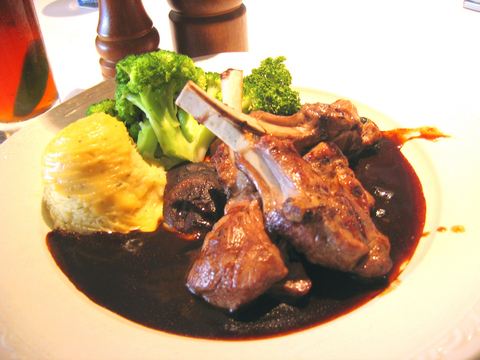Capone's is hardly the new kid on the block when it comes to fine wining and dining. The joint has, however, been through some rough times over the past six years due to bad management, ill conceived menus and interior designs.
The once popular venue could well be on the verge of making a welcome return to the big league in the coming months, however, as its irrepressible new owner Michel Blanc -- who gave Taipei its first genuine sports bar, The Tavern nearly half a decade ago -- has lofty plans for Capone's.
His first job as the new proprietor may be considered draconian by some, but Blanc's sacking of Capone's tardy ball staff has enabled him to fill the void with a crew of his own choosing, and the kitchen staff have been trained by Blanc's trusty Tavern cooks. Result? Instant improvement.

PHOTO: GAVIN PHIPPS, TAIPEI TIMES
While Blanc is, as he puts it "still experimenting with menus and so on" Capone's is open for business and is doing well. He hasn't changed the interior design, but he has revamped the daily band schedule and added several popular draft ales, which means the new Capone's caters to both those looking to enjoy a slap up meal as well those who've just left the office and fancy a swift pint or two.
Drop in on any given lunch time and there's hardly an empty table in the house and should you wish to wine and dine on Fridays and Saturdays, then reservations are now a must.
The a la carte menu is not as extensive as many other Western-style eateries, but is solid enough and filled with enough variations to placate the hungry and to keep regular punters coming back for more.
Some of the joint's top dishes include the pan-fried king prawn (NT$680), roasted lamb chops (NT$690) and the Capone's fillet (NT$650). There's also a reasonable range of pasta dishes which are available in both individual and party sizes and range in price from NT$310 to NT$695.
Although Blanc has yet to finalize any change to the interior design he remains adamant that Capone's will not become yet another sports bar.
"Capone's is a restaurant where people can enjoy fine food and fine wine," he said. "And I've got all the bloody TVs I want at the Tavern. I don't want any here!"

That US assistance was a model for Taiwan’s spectacular development success was early recognized by policymakers and analysts. In a report to the US Congress for the fiscal year 1962, former President John F. Kennedy noted Taiwan’s “rapid economic growth,” was “producing a substantial net gain in living.” Kennedy had a stake in Taiwan’s achievements and the US’ official development assistance (ODA) in general: In September 1961, his entreaty to make the 1960s a “decade of development,” and an accompanying proposal for dedicated legislation to this end, had been formalized by congressional passage of the Foreign Assistance Act. Two

Despite the intense sunshine, we were hardly breaking a sweat as we cruised along the flat, dedicated bike lane, well protected from the heat by a canopy of trees. The electric assist on the bikes likely made a difference, too. Far removed from the bustle and noise of the Taichung traffic, we admired the serene rural scenery, making our way over rivers, alongside rice paddies and through pear orchards. Our route for the day covered two bike paths that connect in Fengyuan District (豐原) and are best done together. The Hou-Feng Bike Path (后豐鐵馬道) runs southward from Houli District (后里) while the

On March 13 President William Lai (賴清德) gave a national security speech noting the 20th year since the passing of China’s Anti-Secession Law (反分裂國家法) in March 2005 that laid the legal groundwork for an invasion of Taiwan. That law, and other subsequent ones, are merely political theater created by the Chinese Communist Party (CCP) to have something to point to so they can claim “we have to do it, it is the law.” The president’s speech was somber and said: “By its actions, China already satisfies the definition of a ‘foreign hostile force’ as provided in the Anti-Infiltration Act, which unlike

Mirror mirror on the wall, what’s the fairest Disney live-action remake of them all? Wait, mirror. Hold on a second. Maybe choosing from the likes of Alice in Wonderland (2010), Mulan (2020) and The Lion King (2019) isn’t such a good idea. Mirror, on second thought, what’s on Netflix? Even the most devoted fans would have to acknowledge that these have not been the most illustrious illustrations of Disney magic. At their best (Pete’s Dragon? Cinderella?) they breathe life into old classics that could use a little updating. At their worst, well, blue Will Smith. Given the rapacious rate of remakes in modern